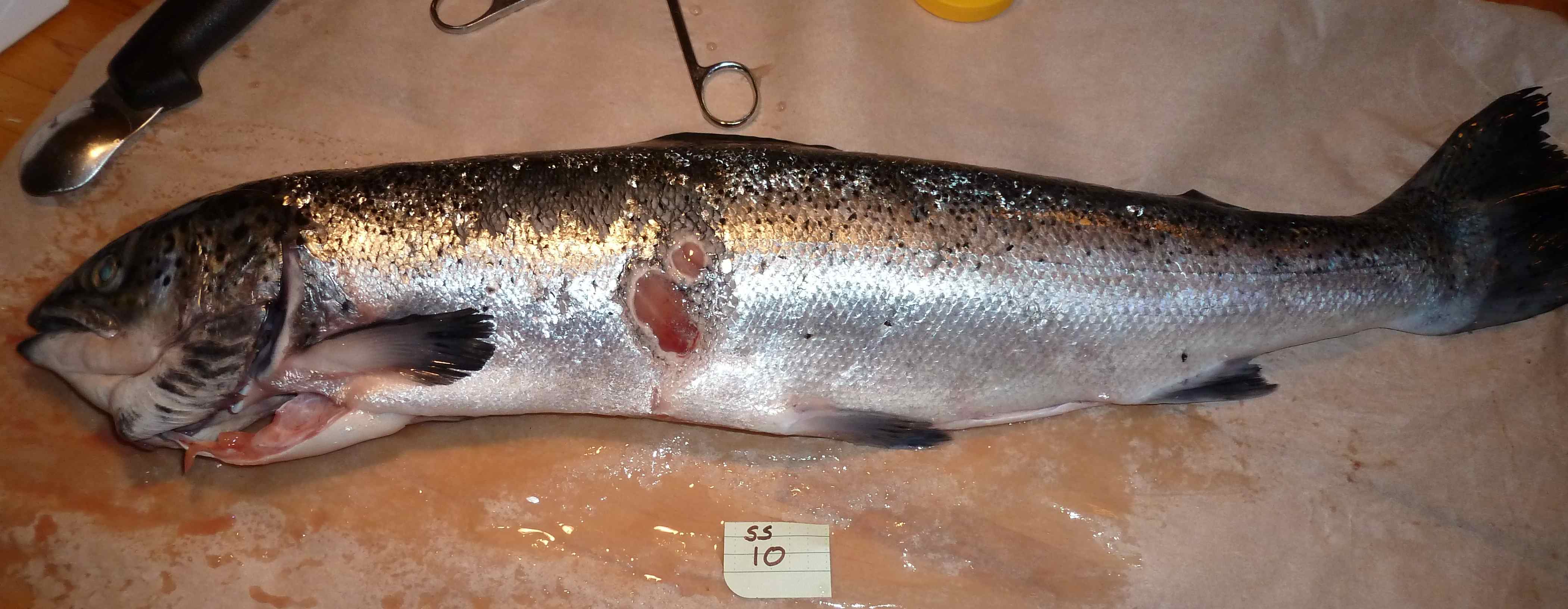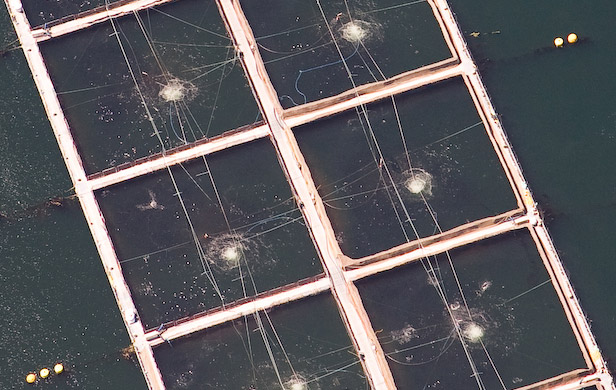A 2015 Federal Court ruling should have brought big changes to B.C.’s salmon farming industry.
The court found Fisheries and Oceans Canada (DFO) was illegally allowing aquaculture companies to transfer smolts — young salmon — with viruses and diseases from hatcheries to open net salmon farms.
It gave the federal government four months to comply with the law and regulations designed to protect wild salmon and the marine environment.
But since then the DFO has failed to heed the ruling.
And now the government is poised to gut an important provision of the Fishery (General) Regulations to protect the multinational aquaculture industry.
It proposes to download the responsibility for testing these fish to the Canadian Food Inspection Agency (CFIA), which has no mandate to protect wild salmon.
The 2015 lawsuit focused on piscine reovirus (PRV) and heart and skeletal muscular inflammation (HSMI).
Recent research confirms that PRV causes the disease HSMI, which has produced mortality rates up to 20 per cent in Atlantic salmon farms in Norway. Other new research suggests PRV is detrimental to migrating wild salmon.
On Nov. 18, 2016, senior DFO veterinarian Dr. Ian Keith emailed colleague Lauren Lavigne setting out the problem.
“Processing plants and hatcheries are point sources for PRV. If there is to [be] sustainable aquaculture the processing plants must treat effluent, and keep any infectious disease out, respectively… If enhancement hatcheries are exempt, this is 19th century thinking.”
The plants Keith refers to process farmed fish for market. Two plants were the subject of a recent viral video by diver and filmmaker Tavish Campbell which showed blood water billowing into wild salmon habitat in Johnstone Strait and Clayoquot Sound. Samples Campbell collected and had analyzed were found to contain PRV.
But the 2015 case focused on smolts, the feedstock for B.C.’s salmon farms. Section 56 of the Fishery (General) Regulations states that the minister (or department) cannot issue a licence to transfer fish from a hatchery to the ocean if the fish “have any disease or disease agent that may be harmful to the protection and conservation of fish.”
After receiving a tip that Marine Harvest was moving infected smolts from its Dalrymple Hatchery near Sayward — one of six the company operates in the province — to nearby salmon farms, biologist and fish farm critic Alexandra Morton took DFO to court for violating the regulation.
Lawyers from Ecojustice, representing Morton made two main arguments.
“We argued that the DFO, as a government body with responsibility for ensuring the health of wild fish stocks, must take responsibility for determining when it is safe to transfer fish into net pens in the open ocean rather than off-loading that responsibility to fish farm operators,” Ecojustice said in a report on the case. “We also argued that the law clearly did not allow anyone to put fish in the ocean carrying diseases or disease agents that could harm the conservation and protection of wild fish.”
On May 6, 2015, the Federal Court ruled in Morton’s favour. Judge Donald Rennie dismissed the arguments of DFO and Marine Harvest.
Rennie found “the weight of the expert evidence before this Court supports the view that PRV is the viral precursor to HSMI.”
“The evidence suggests that the disease agent (PRV) may be harmful to the protection and conservation of fish, and therefore a lack of full scientific certainty should not be used [as] a reason for postponing measures to prevent environmental degradation,” he wrote.

Rennie also echoed one of the key recommendations of the Cohen Inquiry into Disappearing Fraser River Sockeye — that the Precautionary Principle guide DFO’s regulation of the industry and protection of wild fish.
The government first fought the ruling, launching an appeal. But it abandoned the effort in May 2016 at the same time as Dr. Kristi Miller and her team at the Strategic Salmon Heath Initiative (SSHI) found HSMI on a B.C. salmon farm.
An internal DFO communications plan surrounding the announcement of the discovery reveals just how concerned the federal department was about Morton’s legal victory.
A May 6 draft of the “Communications Approach” document includes the statement that the “DFO is appealing the decision… ” But two weeks later the talking point had changed. “DFO intended to appeal in May 2016, but has since requested adjournment until October… ”
The two events — Morton’s case and Miller’s discovery of HSMI — are intertwined and together present a grave challenge to the industry and DFO.
Just how closely they are linked was revealed when Morton and Ecojustice learned the group within DFO responsible for testing these hatchery fish, the BC Introductions and Transfers Committee, was not following the judge’s order and filed a new suit to force DFO to comply.
That case has yet to be heard, but in an affidavit, Marine Harvest’s managing director for Canada, Vincent Erenst, said if the court requires testing and bars transfer of fish with PRV and HSMI into the ocean, “It will severely impact Marine Harvest.” The B.C. farmed salmon industry has about $440 million in sales.
On Jan. 25, 2017, just one week after Marine Harvest filed this affidavit, Andrew Thomson, regional director, fisheries management, signed a memo to DFO regional director-general Rebecca Reid laying out DFO’s policy response to the Rennie decision.
Thomson noted the research by Miller’s team showing HSMI had been found in a B.C. fish farm “will be published shortly.” He then downplays the significance, saying that information from DFO audits and industry reports “does not show elevated fish mortalities associated with disease in B.C.”

And, he concludes, “it is recommended that DFO continue its policy of not testing for Piscine Reovirus (PRV) and HSMI prior to transfers of fish as PRV and HSMI are not of serious concern in B.C.”
Underpinning this decision to ignore the Federal Court order was a re-interpretation of Section 56 and the DFO’s mandate for the “protection and conservation of fish.”
“In this context, the Minister interprets ‘fish’ which must be protected and conserved to be an aggregate of fish, rather than an individual fish,” Thomson wrote. Under the new interpretation, the government would only prohibit transfers of diseased fish “where the genetic diversity, species or ecosystem of a stock or conservation unit may be harmed such that they cannot sustain biodiversity and the continuance of evolutionary and natural production processes.”
In other words, harm to wild salmon would only be considered as a factor if an entire population was threatened.
But that interpretation would almost certainly face a legal challenge.
Last fall, the DFO quietly unveiled its new strategy to deal with the PRV/HSMI problem.
Rather than flouting the law, it decided to change it.
It now proposes to hand responsibility for testing these fish to the Canadian Food Inspection Agency (CFIA), which has no mandate to protect wild salmon. The agency fought Morton and others on acknowledging another virus in B.C. waters, Infectious Salmon Anemia virus, and part of its strategic mandate is to “support industry’s ability to compete globally.”
Under the proposed amendment, DFO would retain responsibility over transfers only “as a last resort,” though it is unclear what that means.
The proposed changes were announced by a Notice of Intent to allow comment.
Ecojustice wrote to the DFO saying the changes “will result in an abdication of the Minister of Fisheries and Oceans’ (Minister’s) primary responsibility to consider the protection of wild fish when issuing transfer and introduction licences.”
“The conservation and protection of wild salmon is a responsibility that the Supreme Court of Canada has confirmed rests squarely with the Minister,” the letter states. “We are troubled by this proposed transfer of responsibility, as the CFIA is not bound by the judicially-recognized duty to place conservation interests above all other interests when making management decisions.”
The DFO justified the change to resolve “program overlap” between the department and the CFIA, each of which conducts testing for diseases.
Ecojustice fired back at that rationale.
“The NOI does not provide concrete examples of how government personnel and industry are overburdened by the current regime… The DFO cannot expect us to blindly accept that having two agencies consider disease risks is a sufficient impetus for this proposed regulatory overhaul.”
If DFO’s change goes ahead, the industry could dodge a bullet in B.C., allowed to continue to place millions of PRV-infected Atlantic salmon in B.C. waters every year.
If DFO fails and the federal court upholds the earlier ruling, it could “severely impact” the industry, in the words of Marine Harvest’s Canadian managing director.
Morton’s case against the DFO for failing to follow the 2015 court ruling is going ahead, and Ecojustice lawyer Kegan Pepper-Smith is uncertain how the government’s new proposal will affect it.
DFO and the industry must file their evidence and rationale for refusing to follow the earlier court order by the end of this month. Ecojustice will then file its evidence and apply for a court date for trial.
In addition to legal challenges at the federal level, the aquaculture industry faces three provincial government investigations — one into the discharging of blood water into the ocean from plants processing farmed salmon; another into the pesticides the industry uses to treat parasites on the farms; and another into the provincial lab which audits the health of farmed fish.
The province controls ocean leases for fish farms, dozens of which come due in June. Washington State recently froze new fish farm licences in the wake of a catastrophic escape of over 300,000 farmed Atlantic salmon.
The future of the Norwegian aquaculture industry in Canada comes down, in great part, to politics.
Provincial and federal government decisions have favoured the industry. But both Prime Minister Justin Trudeau and Premier John Horgan have committed to science-based decisions and accepting the United Nations Declaration on the Rights of Indigenous People (UNDRIP). B.C. fish farms on First Nations’ traditional territories face opposition and protests from Indigenous people.
But to date, both governments have appeared willing to let the DFO gut regulations so foreign-owned corporations can place infected Atlantic salmon in fish farms despite the identified risk to wild salmon and the environment.
Read part one of the series, “Inside DFO’s Battle to Downplay a Deadly Farmed Salmon Disease,” here.
This article was supported by those who generously contributed to the Rafe Mair Memorial Fund for Environmental Reporting on The Tyee. To find out more or contribute, click here.
Read more: Food, Environment
















Tyee Commenting Guidelines
Comments that violate guidelines risk being deleted, and violations may result in a temporary or permanent user ban. Maintain the spirit of good conversation to stay in the discussion.
*Please note The Tyee is not a forum for spreading misinformation about COVID-19, denying its existence or minimizing its risk to public health.
Do:
Do not: